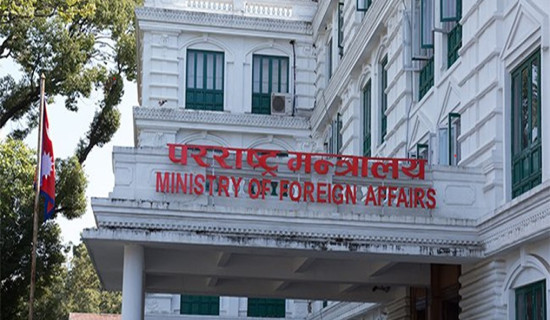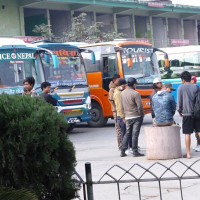- Wednesday, 4 March 2026
What caused lower voters turnout in this election?
Kathmandu, Nov. 27: Though the Election Commission expected 70 per cent voter turnout, only 61 per cent voting was recorded. Some percentage may increase as the process of entry in the commission’s system continues. But the record of suffrage is less than the commission’s expectations.
There was 68.67 per cent turnout in the last House of Representatives election in 2017 whereas it was 74 per cent in local level elections 2022, some six months prior to this election. Re-voting is underway in 15 places including Nawalparasi, Bajura, Gulmi and Surkhet where the voting was postponed.
The voter turnout that stands at 61 per cent is the lowest since the 2008 Constituent Assembly elections. Voter turnout stood at 61.69 per cent that year, too. The highest voter turnout reported since the 1991 elections was in the second Constituent Assembly election in 2013 when 78.74 per cent of listed voters exercised their franchise.
Chief Election Commissioner Dinesh Kumar Thapaliya said an unexpectedly smaller number of voters cast their ballots, though ‘we expected there will be an increase from 61 per cent by the time we get the final report’. Thapaliya further said as high numbers of government staff were deployed to hold the elections, they couldn’t cast their votes. Same was the case with thousands of election observers.
One can cast their votes only from where they are registered. Government officials, security personnel and observers deployed in the areas other than where they are registered were unable to cast their votes. Close to 300,000 officials and security personnel were deployed to hold the polls while over 40,000 were deputed as observers.
However, observers say the reasons are beyond what Thapaliya said. Dolakh Bahadur Gurung, a former election commissioner, said as there was an electoral alliance in many places, committed cadres of the parties were reluctant to vote in the local units where there was no candidate from their party for major positions.
The five ruling parties – Nepali Congress, CPN (Maoist Centre), CPN (Unified Socialist), Janata Samajwadi Party and Rastriya Janamorcha –contested the local polls by forming alliances in many local units. Similarly, the CPN-UML joined its hands with the Rastriya Prajatantra Party Nepal, Janata Samajwadi Party, and Pariwar Dal in some of the local units.
Madhav Paudel, a voter of Palpa Constituency 1 who was wandering in Basantapur on the day of election, said that he did not visit his place for the election this year as there were no desirable candidate from his party. “I have some belief, why should I compromise it with others,” he said. Paudel thinks imposing alliance candidates undemocratically was the reason potential voters ignored voting.
About 78.74 per cent turnout was recorded during Constituent Assembly elections in 2013. Elections used to be a festival to mark it collectively, however it is losing its charm gradually in recent years.
Binita Mahat, a banker in Kathmandu, said that she did not visit her place for the voting because she didn’t like the candidate from her place. “I was not eager to spend my time, money and efforts for an inappropriate candidate,” she added. She said voting actually meant nothing to the voters.
According to her, voters ignored suffrage because neither the parties were loyal towards their agendas in the election manifestoes nor they developed a strong trustworthy leadership to hand it over to the next generation naturally. “Same person holds up years after years with his/her fake commitments,” she added.
Lower voter turnout was noticed this year than at the local level elections. Only 57 to 58 per cent voting took place in Kathmandu Valley while over 60 per cent voting took place in Madhes Province.
Senior leaders of the political parties agree with the point that ‘there is frustration among voters’ for some unhealthy practices and growing trends. Former speaker Subas Nembang said that voters rejected the unhealthy alliance. “I have been there among voters in my district, voters frankly said they do not like the practice of alliance,” he said. He said why would a left voter cast his vote for the democratic poll. Neither the ideologies nor other systems match with each other.
However, Maoist Centre’s General Secretary Dev Gurung denies the fact. “Suffrage record seemed to be low because the voters’ name update was not scientific,” he said. Stressing that alliance was an outcome of the present moment, Gurung said suffrage was natural. He, however, agreed to the point that people were searching for some significant changes inside political parties too.








-square-thumb.jpg)

